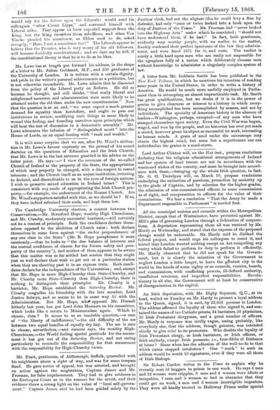The Cambridge University election, a contest between two Conservatives,—Mr. Beresford
Hope, wealthy High Churchman, and Mr. Cleasby, moderately successful barrister,—will certainly not be a contest of principle. Both the candidates declare them- selves opposed to the abolition of Church rates ; both declare themselves in some form against "the undue preponderance of any one class in the State" (Mr. B. Hope paraphrases it more cautiously,—that he looks to "the due balance of interests and the mutual confidence of classes for the future safety and pros- perity of the country"), and neither of them appears to be aware that this matter was so far settled last session that they might just as well declare their wish to get out at a particular station when they are shooting past it in an express train. Both candi- dates declare for the independence of the Universities ; and, except that Mr. Hope is more High-Churchy than State-Churchy, and Mr. Cleasby more State-Churchy than High-Churchy, there is nothing to distinguish their principles. Mr. Cleasby is a barrister, Mr. Hope established the Saturday Review. Mr. Cleasby magnifies his friendship with the late member, Lord Justice Selwyn, and so seems to be in some way lid with the Administration. But Mr. Hope, whcP opposed Mr. Disraeli bitterly last year, has got Lord John Manners on his committee, which looks like a return to Ministerialism again. Which to choose, then ? It seems to us an insoluble question,—a case of "the liberty of indifference,"—the old difficulty of the ass between two equal bundles of equally dry hay. The ass is sure to choose, nevertheless,—and rumour says, the wealthy High- Churchman,—the World feeling special gratitude for the amuse- ment it has got out of the Saturday Review, and not caring particularly to reconcile the responsibility for that amusement with the responsibility for High-Churchy views.






























 Previous page
Previous page